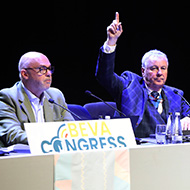King Charles named patron for several vet groups
King Charles will promote and recognise the work of many charities and organisations.
King Charles III has chosen to continue his patronage of several veterinary and animal welfare organisations, continuing a legacy from Queen Elizabeth II.
Groups including the Royal College of Veterinary Surgeons (RCVS) and the British Veterinary Association (BVA) have welcomed the King’s continued support of their work.
News of King Charles’ royal patronages was confirmed by Buckingham Palace earlier this month, revealing that he would be taking on many roles previously held by the late Queen Elizabeth II. As a patron, King Charles will promote and recognise the work of many charities and organisations.
Sue Paterson, president of RCVS, said: “We are delighted that His Majesty the King is our new Royal Patron, continuing his mother’s support for the veterinary professions.
“We know that His Majesty is a keen advocate for animal health and welfare, the environment and biodiversity, and so his interests align very much with ours in areas such as sustainability, tackling antimicrobial resistance, and in supporting veterinary surgeons and veterinary nurses to best meet their professional standards.”
BVA president Anna Judson also welcomed the royal support, which continues a decades-long patronage.
Dr Judson said: “This ongoing royal commitment recognises the vital contribution vets make to animal welfare and their critical role in society, from taking care of the nation’s pets through to ensuring animal welfare in food production, public health and international trade.
“On behalf of our members, we’d like to thank His Majesty for his commitment to BVA, our profession and the work we do.”
King Charles has further extended his support to RSPCA. The animal welfare charity has a 180-year-long connection with the Royal Family, first granted by Queen Victoria in 1840.
His patronage follows that of Queen Elizabeth II, who held her patronage for 70 years.
Chris Sherwood, RSPCA chief executive, said: “His Majesty’s powerful voice for nature and regenerative farming will be vital in raising the profile of animal welfare and inspire more people than ever to create a better world for every animal.
“As we celebrate our 200th anniversary this year, we look forward to continuing our close and enduring association with the monarch and the Royal Family; steadfast in our belief that the UK is, and always will be, a nation of animal lovers, and optimistic at what we can achieve together for animal welfare.”
Image © Shutterstock



 The British Equine Veterinary Association (BEVA) is to allow its registered veterinary nurse (RVN) members the right to vote.
The British Equine Veterinary Association (BEVA) is to allow its registered veterinary nurse (RVN) members the right to vote.